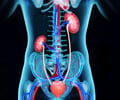A research team has proven that a gene protects some people with diabetes from developing severe kidney failure or end-stage renal disease
Diabetes is the leading cause of end-stage kidney disease worldwide, an illness that requires either kidney dialysis treatments or a kidney transplant for survival.
A research team at Wake Forest University Baptist Medical Center and the University of Heidelberg has proven that a gene protects some people with diabetes from developing severe kidney failure or "end-stage renal disease."The carnosinase 1 gene, located on human chromosome 18, produces the protective factor, said Barry I. Freedman, M.D., the John H. Felts III Professor and head of the Section on Nephrology, in an article in Nephrology Dialysis Transplantation published online.
"This is a major gene that appears to be associated with development of severe diabetic kidney disease," he said.
The research team evaluated 858 subjects, including diabetic patients with end-stage kidney failure on dialysis, diabetic patients with normal kidney function, and healthy non-diabetic individuals. They confirmed that a protective form of the carnosinase 1 gene was present in greater frequency among both healthy individuals and diabetic subjects without kidney disease, compared to the diabetic patients on dialysis who more commonly had forms of the gene that were not protective.
This discovery may lead to novel treatment strategies in susceptible diabetic patients to protect them from kidney failure and may provide a marker to determine which diabetic patients are at increased risk for future kidney disease, Freedman said.
The carnosinase 1 gene produces an enzyme called carnosinase. Carnosinase inactivates the protective substance carnosine. Carnosine appears to prevent scarring from developing in kidney tissue and serves as a scavenger of damaging oxygen-free radicals.
Advertisement
He added that the groups at Wake Forest and in Germany had been looking for the gene or genes after concluding that a region on chromosome 18 was important in predisposing people who have type 2 diabetes (adult onset diabetes) to the development of severe kidney failure. Freedman said the actions of this gene apply to Europeans, American whites and Arabs.
Advertisement
"It is possible that American blacks have different carnosine metabolism, making them less susceptible to alterations in carnosinase gene activity. Analyses are currently under way," said Freedman. "It is also possible that an additional gene or genes on chromosome 18 is associated with susceptibility to end-stage kidney disease in black Americans, and our group is actively trying to identify them."
Freedman said that among people who are susceptible to kidney failure, "it will be important to evaluate whether the administration of carnosine or agents that inhibit carnosinase activity will protect diabetic individuals from the development of progressive kidney disease."
He said that while carnosine is available over the counter in health food stores, it is possible that excessive carnosinase enzyme activity could prevent carnosine supplementation from protecting the kidney. As such, carnosinase blockers may prove to be more important.
Freedman noted that Wake Forest researchers "have one of the largest existing collections of DNA samples from black and white families with multiple members having end-stage kidney disease. We have been evaluating these families since 1991."
Source-Eurekalert
SRI











